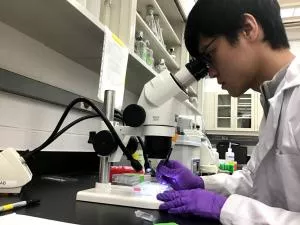
2020 Hottest Paper Award
The Department of Biology, University of Toronto Mississauga is proud to announce the winner and the runner-up of the 2020 Hottest Paper Award
The winner of the 2020 Hottest Paper Award is Arthur Cheng, Phd student, from Mary Cheng Lab with:
Cheng, A. H., P. Bouchard-Cannon, S. Hegazi, C. Lowden, S. W. Fung, C-K Chiang, R. W. Ness, and H-Y M. Cheng. 2019. SOX2-Dependent transcription in clock neurons promotes the robustness of the central circadian pacemaker. Cell Reports 26: 3191-3202.
This paper is a rigorous and exhaustive study using multiple research techniques to elucidate the role of the transcription factor SOX2 in generating circadian rhythms synchronized to the 24 hour day-night cycle. Prof. Mary Cheng highlighted that "this is a break through study using novel techniques that will spur new research in the field".

The two runners-up (unranked) are:
Arjan Banerjee, PhD student, from the Stefanovic lab for his paper:
Banerjee, A. and S. Stefanovic. 2019. Caught in action: fine scale plastome evolution in the parasitic plants of Cuscuta section Ceratophorae (Convolvulaceae). Plant Molecular Biology 100: 621–634.
"Arjan completed a comprehensive analysis of a group of parasitic dodders in order to explore the patterns of molecular evolution associated with the loss of photosynthesis in the plastid genomes (plastomes) of such plants." noted Prof. Sasa Stefanovic.
The other runner-up is Tim Fernandes from the McMeans lab for his paper:
Fernandes, T. and B. McMeans. 2019. Coping with the cold: energy storage strategies for surviving winter in freshwater fish. Ecography 42: 2037-2052.

This paper was innovative, providing a new framework for understanding physiological changes in fish across seasons. It was also exceptionally well written.
"Fernandes and McMeans (2019) is the first large scale synthesis of seasonal lipid dynamics in freshwater fish. The paper is important for both applied fisheries management and fundamental ecology because it identifies a key role of seasonal lipid storage and depletion for the functioning of all freshwater fishes." said Prof. Bailey McMeans.
